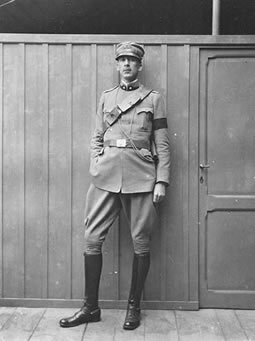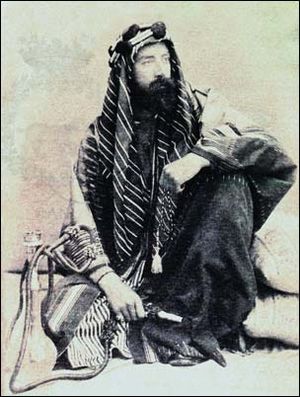ليونى كايتاني
Leone Caetani | |
|---|---|
| Principe di Teano Duca di Sermoneta | |
 Foto del Principe Leone Caetani in uniforme militare di ufficiale di artiglieria, col lutto al braccio per la morte del padre Onorato Caetani (1842-1917) | |
| الدرع | Coa_fam_ITA_gaetani2.jpg |
| سبقه | Onorato Caetani (1842-1917) |
| تبعه | Onorato Caetani, XVI duca di Sermoneta |
| وُلِد | 12 settembre 1869 Roma |
| توفي | 25 dicembre 1935 Vancouver |
| الزوج | Vittoria Colonna |
| الأنجال | Onorato Caetani |
| الأب | Onorato Caetani (1842-1917) |
| الأم | Ada Costanza Bootle Wilbraham |
Leone Caetani (September 12, 1869 – December 25, 1935), Duke of Sermoneta (also known as Prince Caetani)، كان باحثاً إيطالياً، وسياسياً ومؤرخاً للإسلام والشرق الأوسط. ترجم نشر « تجارب الأمم » لابن مسكويه وألف « تاريخ الإسلام » (10 أجزاء)، و« دراسات في تاريخ الشرق » (3 أجزاء) إلى اللغة الإيطالية، وشارك في تحرير المواد الإسلامية في الموسوعة الإيطالية.[1]
Caetani is considered a pioneer and founding father in the application of the historical method on the sources of the early Islamic traditions which he subjected to minute historical and psychological analysis.[2]
He emigrated to Canada in 1927 with Ofelia Fabiani. They brought with them their daughter Sveva, who after an appalling childhood emerged as a highly talented painter.
Life
Caetani was born in Rome into the prominent and wealthy Caetani family. His father Onorato, Prince of Teano and Duke of Sermoneta, was Minister of Foreign Affairs in Italy in 1896 in the second di Rudini cabinet; his English mother, Ada Bootle Wilbraham, was the daughter of the Earl of Lathom. His paternal grandfather, Michelangelo, had married the Polish countess Calixta Rzewuski, whose ancestor Wacław Seweryn Rzewuski had been a well-known Polish orientalist.
Caetani developed an interest in foreign languages at an early age. At 15 he began to study Sanskrit and Arabic on his own. Later he studied Oriental languages at the University of Rome, under Ignazio Guidi and Giacomo Lignana, with an intensive study of Arabic, Hebrew, Persian, Sanskrit and Syriac languages (and perhaps also Turkish).
Caetani spent many years researching and travelling throughout the Muslim world gathering a great deal of material on a wide range of Islamic cultures from Tunisia, Algeria, Egypt, Syria, Turkey, Iraq, the Levant, the Sahara, India, Central Asia and southern Russia. Later, one of his disciples was Giorgio Levi Della Vida.
He had become a corresponding member of the Accademia Nazionale dei Lincei in 1911 and a full member in 1919. Later on, he left his rich library to the Lincei to create the Caetani foundation for Muslim studies.
Leone Caetani also served as a deputy of the Italian Parliament (1909–1913), keeping a radical socialist stance. He had married Vittoria Colonna Caetani of the Colonna, daughter of Marcantonio VI prince of Paliano, from which he later separated;[3] since 1917 he had succeeded his father as Prince of Teano and Duke of Sermoneta.
Due to his family's situation, after the end of his marriage[4] and to the rise of Fascism, in 1927 he decided to emigrate to Vernon, British Columbia, Canada, with his new partner Ofelia Fabiani and their daughter Sveva. He later become a Canadian citizen. In 1935, the Fascist regime stripped him of his Italian citizenship and expelled him from the Accademia dei Lincei; he died soon afterwards in the same year in Vancouver, British Columbia.
Research
Caetani made extensive analysis of sources related to the origins of the Qur'an and Islamic thought between 1904–1926 during which he collected and arranged chronologically and sequentially all known existing primary sources and materials related to the origins of Islam. Caetani presented his critical analysis and conclusions regarding what he believed to be inconsistencies, contradictions and variances in the Islamic sources in his work in ten volumes "Annali dell'Islam".[5][6]
One of Leone Caetani's studies, Uthman and the Recension of the Koran, is included as a chapter in The Origins of The Koran: Classic Essays on Islam’s Holy Book edited by Ibn Warraq.
References
- ^ الموسوعة العربية الميسرة، 1965
- ^ From Babel to the dragomans Bernard Lewis Then came a second phase, when the great nineteenth-century scholars began to apply critical method, treating Muslim historians in the same way they had treated Greek, Latin, and their own historians, trying to detect biases, distortions, variant versions and so on. Here I am thinking particularly of the work of such founding fathers of our discipline as de Goeje, Wellhausen, Caetani and others.
- ^ they had a son, Onorato (1902 - 1948), mentally and physically disabled; for further details on Caetani biography and familiar life, see Marella Caracciolo Chia, The light in between, Pushkin Press 2013, ISBN 978-1908968050
- ^ Caetani was upset by the impossibility, under the Italian laws of that time, to pass his name to the illegitimate daughter he had had with another woman
- ^ Studies on Muhammad and the Rise of Islam A Critical Survey Ibn Warraq Caetani had "compiled and arranged (year by year, and event by event) all the material which the sources, the Arab historians offered. The resultant conclusions based on the facts, which took into account the variant forms in which they were found in the sources, were accompanied by a critical analysis that reflected the methodological skepticism which Langlois and Seignobos [109] had just set forth as absolutely indispensable for the historian." 110
- ^ "Review: Annali dell' Islam by Leone Caetani". The Athenaeum (4196): 379–380. March 28, 1908.
Works
- Annali dell' Islam (Milan, Ulrico Hoepli, 1905–1907), 10 volumes
- "Uthman and the Recension of the Koran", Muslim World 5 (1915), pp. 380–90
- Study of the history of the Orient (Milan, Ulrico Hoepli, 1914)
وصلات خارجية
- Caetani, Leone in Dizionario Biografico degli Italiani – Volume 16 (1973)
- Fondazione Caetani per gli studi musulmani presso l'Accademia dei Lincei
- https://web.archive.org/web/20050930010903/http://www.iant.com/imam/methodol.txt
- LATIUM – Online Information article about LATIUM at encyclopedia.jrank.org
- The Caetani Family: Popes, Princes, Scholars and Artists :: Greater Vernon Museum & Archives at www.vernonmuseum.ca
- The Caetani family: The Caetani Family: Popes, Princes, Scholars and Artists
- CS1: Julian–Gregorian uncertainty
- Pages using infobox noble with unknown parameters
- مقالات ينقصها مصادر موثوقة
- مقالات ينقصها مصادر موثوقة from November 2010
- 1869 births
- 1935 deaths
- Politicians from Rome
- Italian emigrants to Canada
- Non-Muslim scholars of Islam
- مؤرخو الإسلام
- Islam critical scholars
- Members of the Lincean Academy
- Deaths from cancer in British Columbia

